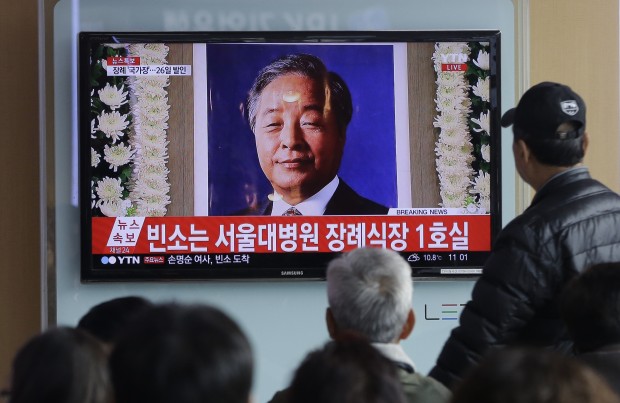Former President Kim Young-sam dies at age 88

People watch TV news program showing a portrait of the late former South Korean President Kim Young-sam at Seoul Railway Station in Seoul, South Korea, Sunday, Nov. 22, 2015. Kim, who formally ended decades of military rule in South Korea and accepted a massive international bailout during the 1997-1998 Asian financial crisis, died Sunday. He was 87. The letters at a screen read ‘” Memorial altar for Kim is Seoul National University”. (AP Photo/Ahn Young-joon)
On Sunday 22 November, Former South Korean president Kim Young Sam, died at the age of 88. Kim, who had been hospitalized with a fever and breathing problems since Thursday, died at 12:21 a.m., according to Seoul National University Hospital. He had ended decades of military rule in South Korea and accepted a massive international bailout during the 1997-1998 Asian financial crisis.
“The late Kim Young-sam dedicated his whole life to democratize and develop our country as the 14th president,” Prime Minister Hwang Kyo-ahn said at a Cabinet meeting discussing funeral arrangements. “The government will do its best to commemorate him at the state funeral.”
The ceremony will take place at the National Assembly on Thursday after a five-day mourning period, he said, adding Kim will be buried at the National Cemetery in Seoul as per his family’s wish.
As an iconic figure of South Korea’s pro-democracy movement, he fought against military rulers for decades and laid the foundation of a peaceful power transfer in a country that had been marked by military coups.
During his presidency from 1993-1998, he had his two general-turned predecessors indicted on mutiny and treason charges stemming from a coup. Kim pardoned the two convicted military men — Chun Doo-hwan and Roh Tae-woo — at the end of his term.
Kim also faced the first nuclear crisis in 1994 when the Clinton administration was considering striking Yongbyon — home to North Korea’s nuclear complex — north of North Korea’s capital, Pyongyang. Kim was vehemently against the idea, citing a possible war.
Kim was elected in 1954 as the youngest member of the National Assembly. At that time, he was in the ruling party of the late Rhee Syng-man, South Korea’s first president.
But a few months later, he broke with the ruling regime in protest of a constitutional revision and joined the opposition party, suffering hardships from the military rulers.
























































